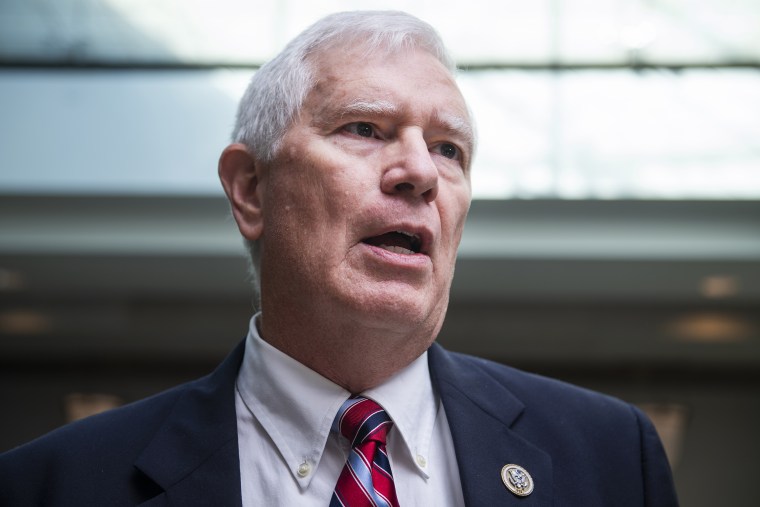GOP Rep. Mo Brooks of Alabama wants to scare the more than 80 million Americans who voted for President-elect Joe Biden into thinking that there is a chance he and other Republicans in Congress could overturn the 2020 election results. To this end, Brooks stated Wednesday that he’s planning to challenge the Electoral College votes when they are reviewed by Congress on Jan. 6. As Brooks put it (without any evidence): “This election was stolen by the socialists engaging in extraordinary voter fraud and election theft measures.” Brooks also shared he’s actively seeking to recruit additional GOP members of Congress to join his efforts to prevent Biden from becoming the 46th president because as he sees it, “Donald Trump won the Electoral College by a significant margin.”
Brooks’ words have raised alarm bells with progressives, with my SiriusXM radio Wednesday night getting a flood of concerned listener calls.
Brooks’ words have raised alarm bells with progressives, with my SiriusXM radio Wednesday night getting a flood of concerned listener calls. And if I wasn’t familiar with the law that controls the counting of electoral votes, I, too, might be concerned. But here’s the bottom line: Brooks’ partisan, fevered dream isn’t going to happen. And on some level, we should thank Brooks for raising this issue now, well ahead of the Jan. 6 date when a joint session of Congress counts the electoral votes. (While nothing is technically impossible, the only way for Brooks to be successful would be for House Democrats to join him in rejecting the electoral votes — and that ain’t happening.)
Want more articles like this? Follow THINK on Instagram to get updates on the week's most important political analysis
Biden is projected to win 306 electoral votes, well over the 270 required to become the next president. The Electoral College formally votes Dec. 14, and experts agree "faithless" electors will not overturn the election. Then, pursuant to federal law, a joint session of Congress will be held Jan. 6 to count and accept these electoral votes.
If during that session, Brooks were able to raise objections and convince enough members of both the Senate and the House to toss out electoral votes in a few key battleground states, then Biden could fall below the 270 vote threshold.
What happens then, per the 12th Amendment to the U.S. Constitution, is that the House of Representatives would select our next president. This would actually be bad news for Democrats, even though they technically control the House. The 12th Amendment dictates that each state gets one vote for president, and with the GOP controlling 26 state delegations, bingo, you have Trump as president again.
But while a fun constitutional thought experiment, in reality, it doesn't matter. The Electoral Count Act provides that when Congress holds its joint session to review duly certified electoral votes Jan. 6, if one member from both the House and the Senate object — in writing — to state electoral counts, it will trigger a stoppage in the count. Then the House and the Senate will separately consider the objection — for up to two hours.
And here’s where Brooks’ fantasy gets a bucket of cold water tossed on it. To reject the electoral votes from any state, both the House and the Senate must agree to do so. As the nonpartisan Congressional Research Service explains, "Both houses must vote separately to agree to the objection. Otherwise, the objection fails."
Thankfully, this vote is not by state delegation. Since the Democrats control the House, Brooks’ pipe dream comes to an end.
Now to be fair — which is very unlike me — I will note that the last time there was a formal objection like this was after the 2004 election, in which George W. Bush was re-elected, defeating John Kerry. (This was only the second formal challenge, per the Congressional Research Service.) At that time, Sen. Barbara Boxer, D-Calif., along with several House Democratic members objected to the count in Ohio, alleging there had been widespread voter “irregularities.”
The objection was voted down 74 to 1 in the Senate and 267 to 31 in the House, meaning Ohio’s electoral votes were counted. But comments from Republicans 16 years ago represent a complete reversal from what we are seeing now. At the time, House GOP majority leader Tom DeLay of Texas slammed the Democrats’ objection in Ohio as the shameful actions of conspiracy theorists he dubbed the party's "X-Files" wing. Other Republican House members criticized Democrats for only wanting “to gripe about counts, recounts, and recounts of recounts," urging them to “get over it.”
Ahhh, politics. While GOP Senate leaders currently have signaled little to no enthusiasm for Brooks' plan, if Trump starts lobbying them, that could change. Brooks may very well be able to enlist one GOP senator — or even more than one — to join Jan. 6, given that such grandstanding will ingratiate them with Trump's base. This will likely cause a several-hour delay in the process. But that’s all it will be — one final delay. So let the GOP have their little political theater if it makes them feel better about Trump’s loss. Come Inauguration Day, Trump will be yelling at TV screens in Mar-a-Lago, and Joe Biden will be sitting behind the Resolute Desk.
Related:


